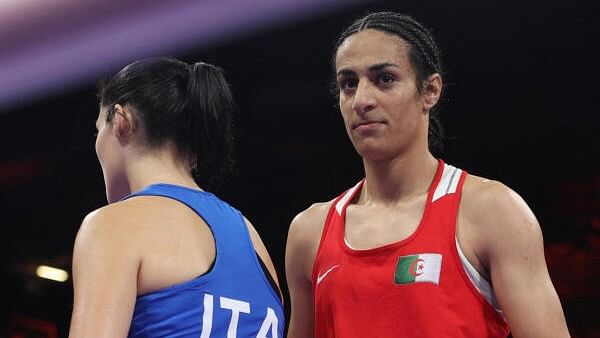
Imane Khelif of Algeria and Angela Carini of Italy react after their fight.
Credit: Reuters Photo
Paris: Lin Yu-ting strode toward the boxing ring Friday fully aware that she was walking straight into a swirling controversy that has turned the Paris Olympics into a forum for a fierce debate about biology, gender and fairness in women’s sports.
Lin, who competes for Taiwan, stepped through the ropes for her opening match, bowed a couple of times and got to work. Emerging victorious about 15 minutes later, she greeted some of her supporters and then left the arena as silently as she had arrived. She declined to speak to reporters.
At the same time, Olympic officials were working urgently to rebut what they described as widespread “misinformation” — spurred by a 46-second fight Thursday — that led some to question the presence of Lin and another boxer, Imane Khelif of Algeria, in the Paris Games a year after they were disqualified from the world championships in a dispute about their eligibility.
Mark Adams, the chief spokesperson for the International Olympic Committee, criticized news articles and social media posts that he said sought to cast doubt — unfairly, in the view of Olympic officials and even some other competitors — on the gender of Khelif.
“There has been some confusion that somehow it’s a man fighting a woman,” Adams said. “This is just not the case scientifically.”
Adams stressed at a news conference that Khelif and Lin are not transgender. And he defended the right of both boxers to compete in Paris.
“The question you have to ask yourself is, are these athletes women?” Adams added later. “The answer is yes, according to their eligibility, their passport, their history.”
Khelif won her opening bout Thursday when her Italian opponent, Angela Carini, abandoned their bout after taking a powerful punch to the face. Carini’s comments immediately afterward about the force of Khelif’s punches provoked strong reactions, including from Italy’s prime minister, who criticized what she called “a match that did not seem on equal footing.”
Carini later told reporters that the controversy over her defeat “makes me sad” and said she was worried about the focus on Khelif, who will fight next in the quarterfinals Saturday. “If the IOC said she can fight,” Carini said of Khelif, “I respect that decision.”
The fallout from Khelif’s victory, however, brought new scrutiny to the various and sometimes minimal and vague rules regarding eligibility for some women’s sports. As questions about gender eligibility have grown more complex, the IOC has left it up to individual sports governing bodies to determine their own eligibility rules.